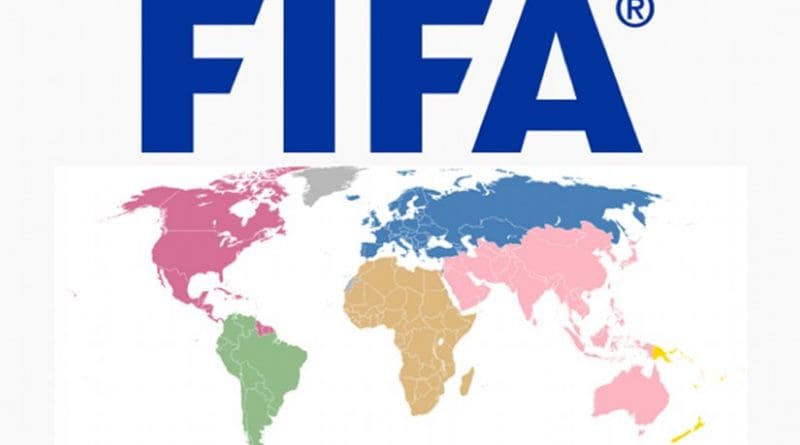‘Orthodox Four’ Aim At Hosting FIFA World Cup In 2030
By EurActiv
By Georgi Gotev
(EurActiv) — Bulgaria will take part in a joint bid to host the 2030 FIFA World Cup, Prime Minister Boyko Borissov announced on Friday (2 November), together with Serbia, Greece and Romania, a format dubbed by diplomats and journalists “the Orthodox Four”.
Borissov broke the news following a meeting with Greek Prime Minister Alexis Tsipras, his Romanian colleague Viorica Dăncilă and Serbian President Aleksandar Vučić in the Euxinograd palace near Varna. The leaders of the four countries have this time been joined by Israeli Prime Minister Benjamin Netanyahu.
The first gathering of the four Balkan countries took place on 3 October 2017 at the Euxinograd Palace on the Black Sea in Sofia, and diplomats called the format “the Orthodox Four”.
A second meeting was held in Belgrade on 8 December a third one in Thessaloniki on 5 July. Traditionally, the agenda of such meetings focuses on regional infrastructure.
Borissov is a big football fan and occasionally plays as a forward for the football club FC Vitosha Bistritsa. In 2013, he became the oldest player ever to play for a Bulgarian professional club when he appeared for Vitosha in the B Group, the second division of Bulgarian football.
Borissov’s favourite international team is Real Madrid. Last May he visited Kyiv just as it was hosting the Champions League finals between Real Madrid and Liverpool. He attended the match, which his favourite team won by 3-1.
However, Bulgaria’s national football team has fared much less impressively in recent years. Its biggest success remains the 1994 World Cup in the USA, where the national team, featuring stars such as Stoichkov, Balakov or the late Trifon Ivanov, reached the semi-final, losing 2-1 to Italy.
Worse still, Bulgaria does not have a single stadium that meets the requirements for hosting a championship match. In recent months, Borissov has repeatedly raised the idea of building a football stadium on the outskirts of Sofia, for a budget of 100 million leva (€50 million).
A strong argument in his favour is the venue of the current national stadium, in the middle of Sofia. Every match, despite the modest attendance, blocks the traffic in the capital.
The 2022 FIFA World Cup will be held in Qatar, while the 2026 cup will be jointly hosted by 16 cities in three North American countries.
The 2030 FIFA World Cup will be special, as it will take place 100 years after the first World Cup in Uruguay. The first proposed bid for the 2030 World Cup was a joint bid from the Argentine and Uruguay’s Football Associations.
The second was by The Football Association of England, and the third by The Royal Moroccan Football Federation in a joint bid with Algeria and Tunisia.
Regional infrastructure on agenda
As in previous meetings of the ‘Orthodox Four’, the leaders discussed regional infrastructure.
“Our four-way meeting has always had one goal vis-à-vis the EU – to raise the level of connectivity, in energy, infrastructure, digital, and our policy has never been targeted against third parties, on the contrary – we believe that with the accession of Serbia to the EU, the EU will become stronger ,” Borissov was quoted as saying.
Speaking to the press, the Romanian prime minister put emphasis on cohesion policy, a theme which is expected to be a highlight of the upcoming Romanian Presidency of the Council of the EU.
Greek premier Alexis Tsipras announced that a memorandum will be signed for the construction of a railway connecting the Bulgarian port of Burgas on the Black Sea and the Greek port of Alexandroupoli on the Aegean Sea, as well as a highway from Alexandroupoli to the Bulgarian border.
For Serbia, Vučić said, energy projects were of big importance.
Israeli PM Netanyahu stressed the need to create high-tech prerequisites to fight terrorism. In many cases, he said it had been possible to prevent terrorist attacks thanks to assistance from each of the countries represented.
“Not everyone in our countries knows about this, but I want to thank you for this co-operation and express my intention to continue this general activity to save lives.”
Netanyahu said that there had been discussions on how to enhance co-operation with Israel. “There are, however, three things in the general context that are particularly important: the first is technology, the second is energy and the third is security,” he said.
The Israeli premier said the last two foiled terrorist attacks in Paris and in Denmark had been prevented by his country’s secret services.

